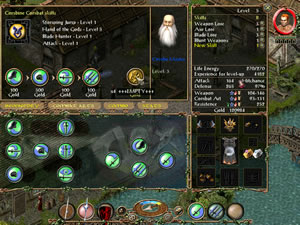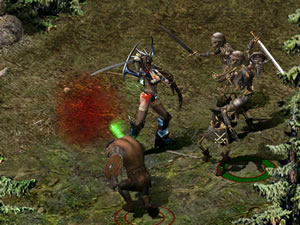Every click is sacred.
Role-playing games have gotten so complex that you can spend days
just working out the perfect
formula for crafting the Imbued Teir’dal Chain Neckguard
and never even see a monster. The depth and longevity of some of these games
has gotten so immense that I almost forgot about the addictive fun of the hack-and-slash
RPG’s like Diablo, Baldur’s
Gate: Dark Alliance, and most recently, Sacred.
In fact, Sacred plays just like Diablo with
an overhead view and lots and lots of clicking. Click to move, click to open
a door or a chest, click (and keep clicking) on a monster to attack. It’s simple,
effective, and staggeringly easy to learn. However, that doesn’t automatically
make it good.
It seems a terrible demon has entered the world of Ancaria and has broken free from his protective pentagram. The entire world is threatened, but nobody knows it yet, and you’ll be dealing with plenty of petty human squabbling and stabbing thousands of hapless orcs before you ever confront the ultimate evil. How you decide to get there is up to you.
The character selection gives you six choices: Dark Elf, Gladiator, Vampiress, Wood Elf, Battle Mage, and Seraphim. Simplicity is nice, but Sacred has taken it a little too far. You cannot customize your character at all, no different heads or bodies or even sexes – there is no male Vampire, and no female Gladiator. You have some leeway over choosing your different skills as you gain levels, but your starting stats and subsequent increases are automatic to your class, leaving you with only one paltry point to put wherever you wish.
Characters end up becoming differentiated mostly by which class-unique Combat Arts players decide to pursue, but even that is somewhat randomized because Combat Arts are not level based, instead dependant on specific icons found in loot. You can trade for the icon of your choice (at a 4 to 1 rate), giving you a small measure of control. As a Vampiress, do you focus on Awaken Dead and raise an undead army, or Claws of Death to become your own engine of destruction? You can also combine up to four Combat Arts into a devastating combo which you can perform intermittently. However, for most classes, your best bet is to just use four copies of your most powerful attack.
While you’re actually out and about slaying things, you forget about a lot
of these limitations. It’s oddly addictive to keep clicking on things and killing
them. And you don’t have to sweat any of the little details, making it a much
more arcadey experience.
 The graphics are good, letting you zoom in close to check out the action or pull way back (the far more useful view) to check out your surroundings. Characters actually wield the items and weapons with which you equip them. Animations are smooth, and the framerate stays up even when lots of monsters are on screen…and like Diablo, lots and lots of monsters can be onscreen at once. There’s no blood in the American version, but you can turn it back on if you cheat a bit.
The graphics are good, letting you zoom in close to check out the action or pull way back (the far more useful view) to check out your surroundings. Characters actually wield the items and weapons with which you equip them. Animations are smooth, and the framerate stays up even when lots of monsters are on screen…and like Diablo, lots and lots of monsters can be onscreen at once. There’s no blood in the American version, but you can turn it back on if you cheat a bit.
The sound is a bit of a bummer with relatively few and often repetitive battle effects. The fantasy soundtrack seldom kicks in, and you’ll barely notice when it does. On the other hand, the voice acting is strangely decent and some of the contextual quotes by the characters lend a nice authentic feel to the game. Take your Wood Elf into the city and she might complain about the stench, for instance.
But the best part of Sacred is its enormity. This is a huge, long game, and it all plays out on one seamless, loadless map. Although there is an overall linear story and corresponding missions, there are also lots of side quests. Like Morrowind, you can go anywhere you want, although you may find yourself quickly slain when you get there. This gives Sacred a great open-ended feel.
Unfortunately, Sacred trips over a couple of its own programming flaws on the way there. It’s often difficult to click on your enemies, and when you stop clicking, your character stops fighting. There seems to be an odd lag in the combat, especially when you want to use a special move or a combo. Due to some weird technical goof, you sometimes will have to activate it several times before it happens. The frustration doubles if you are riding a horse, which otherwise would have been a pretty cool addition to the game.
 Add to that a few other glitches, some broken side quests and the occasional missing bit of dialogue with only a text
Add to that a few other glitches, some broken side quests and the occasional missing bit of dialogue with only a text
placeholder, and you have a game that clearly needed more time in the cooker.
It also could have used more time in the development back room, because Sacred just
doesn’t offer nearly enough complexity to keep you playing for long stretches.
The inability to really grow your character the way you wish takes a big bite
out of the fun factor. The first two letters in RPG stand for something, you
know.
The game also comes with multiplayer components, from co-op play through
the single-player to actual 16 person player vs. player combat. It’s a nice
inclusion, but the glitches don’t do any wonders for the online clicking.
While Sacred is a fun, addictive diversion, its relentless simplicity makes it feel like it’s not quite a full fledged game. I don’t need a complex crafting system, but I do need to feel like I have some control over my character’s abilities and destiny. As it stands, Sacred just can’t quite earn its angel’s
wings.









